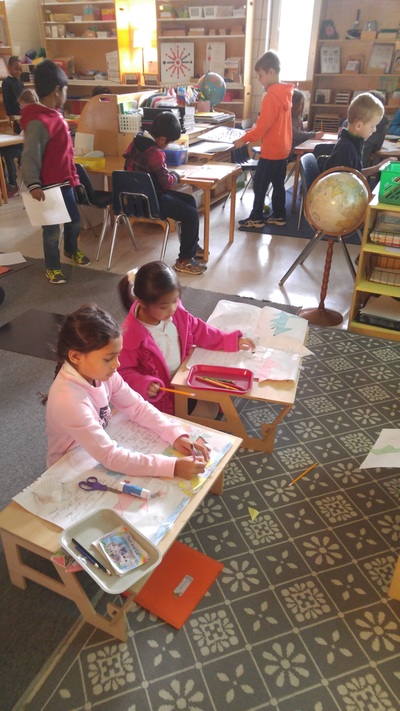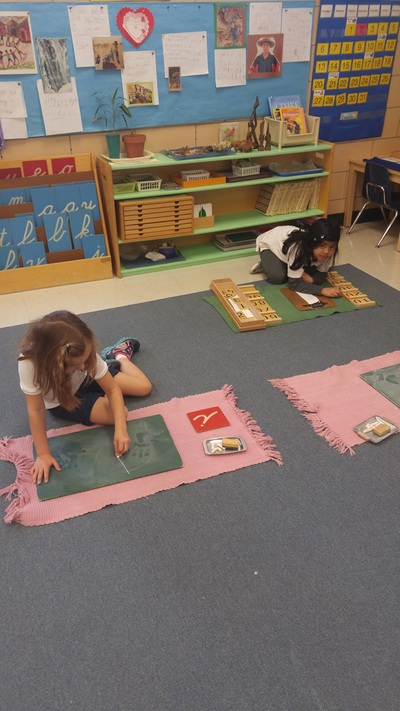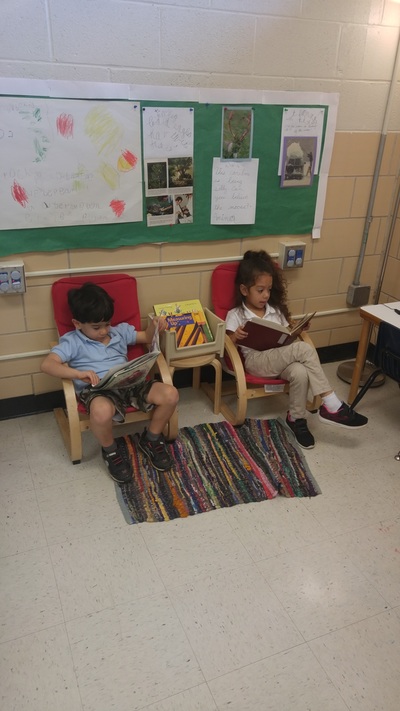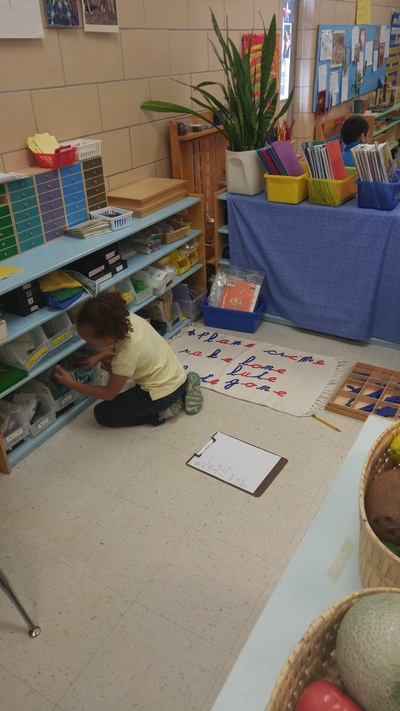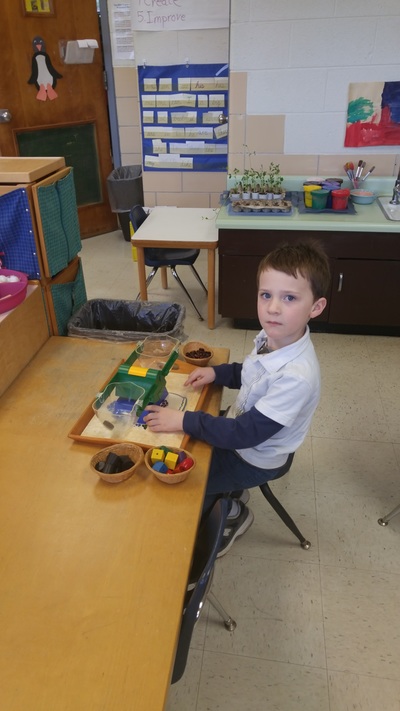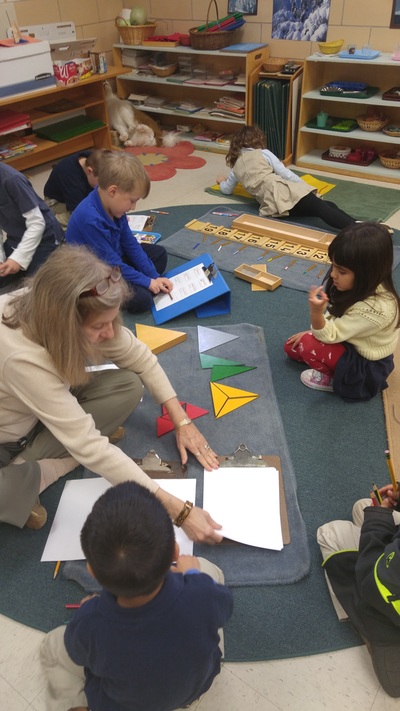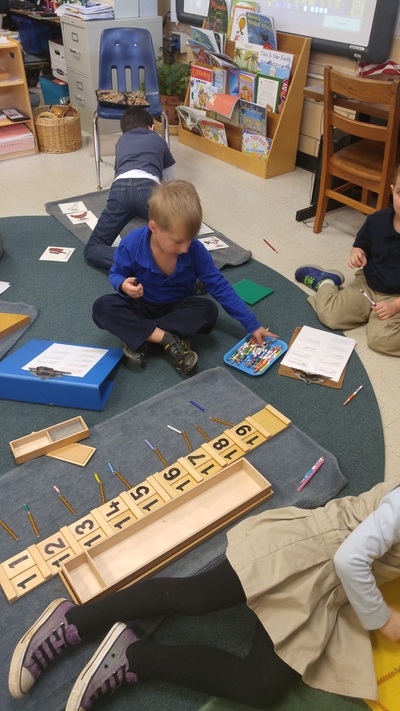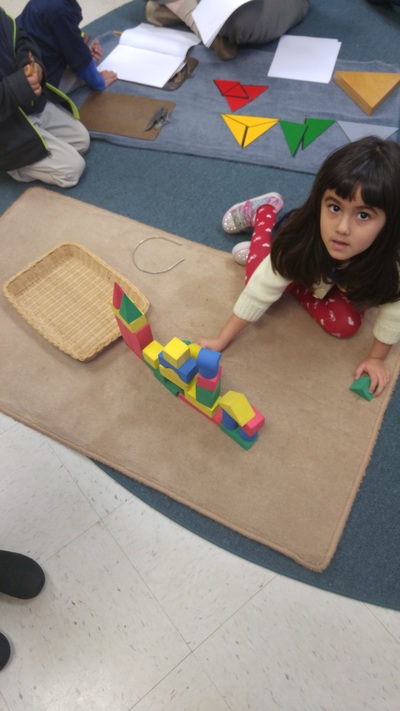Montessori Program
Huntley Hills is proud to offer our Montessori program to local students and school choice for DeKalb County School System.
The Montessori Method of education, developed by Dr. Maria Montessori, is a child-centered educational approach based on scientific observations of children from birth to adulthood. Dr. Montessori’s Method has been time tested, with over 100 years of success in diverse cultures throughout the world.It is a view of the child as one who is naturally eager for knowledge and capable of initiating learning in a supportive, thoughtfully prepared learning environment. It is an approach that values the human spirit and the development of the whole child—physical, social, emotional, cognitive.
DeKalb County School Choice-Typically in January
K-5 Local School Montessori Lottery-Typically in March
Montesorri:
What is Montessori?
Is Montessori a "good fit" for my child?
25 Charateristics of Montessori
The Montessori Method of education, developed by Dr. Maria Montessori, is a child-centered educational approach based on scientific observations of children from birth to adulthood. Dr. Montessori’s Method has been time tested, with over 100 years of success in diverse cultures throughout the world.It is a view of the child as one who is naturally eager for knowledge and capable of initiating learning in a supportive, thoughtfully prepared learning environment. It is an approach that values the human spirit and the development of the whole child—physical, social, emotional, cognitive.
DeKalb County School Choice-Typically in January
K-5 Local School Montessori Lottery-Typically in March
Montesorri:
What is Montessori?
Is Montessori a "good fit" for my child?
25 Charateristics of Montessori
Q: What grade levels does Huntley HIlls Montessori Elementary serve?
A: Our lower elementary school serves children ages 4-9 years in grades 1-3. Our upper elementary class serves children 10-11 years in grades 4-5.
Q: Will my child cover the same subject matter as in traditional education? Does your curriculum meet state standards?
A: Yes. Our teachers carefully review the state standards from common core and make sure that our students cover these standards, plus much more.
As trained Montessori teachers, they look at the whole child, recognizing a variety of learning styles and allowing each child to develop at his own rate and in his own way. Montessori elementary students, depending on individual readiness, generally surpass the expectations of the state curriculum because the Montessori materials and the one-on-one attention allow them to progress at a rapid, yet thorough, pace.
Q: How do you assess students' progress? Do you give standardized tests?
A: Our Elementary Montessori curriculum is carefully structured and the teachers maintain thorough records of each student's academic development.
Student progress is measured in a variety of ways including careful observation and recording of their daily work, demonstrated skills and understanding of the materials.
The teachers also give tests at regular intervals during the year. They use the results of these tests as feedback and tools to determine if a student needs a new lesson or more practice and not as a competition between children for grades. Our students become well prepared for any system that requires testing. They actually enjoy the opportunity to demonstrate their success!
We administer the same standardized tests given in the DeKalb County School District each year. Students, grades 1 - 3 are tested with the STAR reading and DRA. Students, grades 4-5 are tested with the STAR Reading and Math, using "complete battery" of tests, which includes math, language and reading, as well as science, social science, listening, using information and thinking skills. These standardized tests help teachers and parents determine individual student strengths as compared to the child's age group nationally. Our goal is not only to prepare our students to perform at grade level, but to achieve their highest potential. Students in grades K-5 take the MAP assessment and Grades 3-5 take the GA Milestones.
Q: How are parents informed of their child's progress?
A: Our teachers keep in close contact with the parents and communicate the students' academic success and social integration on a regular basis, both informally and through parent conferences and Progress Reports. In STAR folders, the teachers send home a pocket folder with each child containing work completed that week.
Q: When is the best time to talk with my child's teacher?
A: We encourage you to communicate freely and frequently with your child's teachers and to observe your child's classroom as often as you would like. If you have time at the end of the school day, a quick, informal chat is a good way to stay in contact. For more in-depth quality time, please feel free to schedule appointments to meet with your child's teachers.
During morning arrival, the teachers' attention needs to be focused with the children and we strive to keep interruptions to a minimum. If you need to speak with a teacher in the morning, please make arrangements before school begins, if possible.
Q: What values do you teach as part of your program?
A: The love of learning is at the core of Montessori values. Children and teachers work together to develop guidelines to create an environment conducive to work and growth. Speaking and acting with kindness, integrity and respect is our top priority. The children are engaged in the process of developing internal discipline, insight and growth.
Some of the other values integrated into our program are citizenship, responsibility, independence, cooperation, teamwork, tolerance for differences, peaceful resolution of conflicts, compassion and gratitude.
Q: Why is it so important that my child become self-directed?
A: Our students are learning to evaluate choices, make decisions and prioritize. They are learning to trust their own good judgment and develop the ability to make wise choices. This will serve them well in their teenage years when they'll need to handle peer pressure and temptations that often confront young people today. Our students tend to think independently rather than following group pressure.
Q: Is Montessori right for gifted children? What about children with learning disabilities?
A: The Montessori approach is designed to help all children reach their fullest potential at their own unique pace. A gifted child can go as far and as a fast as he or she likes, and a child with a learning disability can move at their own rate and style without fear or stigma.
The multi-age grouping allows each child to find his or her own pace without feeling "ahead" or "behind" in relation to their peers. In the classroom with children of varying abilities and strengths, everyone learns from one another and everyone contributes.
Q: Why is there so much variation from one Montessori school to another?
A: The name Montessori refers to a method and philosophy and is not protected by copyright or by a central licensing or franchising program.
Although most schools try to remain faithful to their understanding of Dr. Montessori's insights and research, they have all been influenced by the evolution of our culture and technology and their own interpretations or adaptations of the method.
Q: Are your teachers certified?
A: Yes. Our teachers are highly trained professionals. They are all Montessori trained and certified and continue their learning with ongoing professional development and study.
We have carefully chosen our Montessori teachers and assistants for their experience and education, for their abilities to relate to and understand children, for their genuine love of learning, and for their qualities as outstanding role models.
Q: How do Montessori teachers differ based on their training from different organizations such as AMI, AMS, PAMS, etc.?
A: There are a number of organizations training and certifying Montessori teachers. The three principal ones are American Montessori Internationale (AMI), American Montessori Society (AMS), and Pan American Montessori Society (PAMS). All three of these organizations are certified by the Montessori Association of Teacher Training (MACTE) and accredit highly qualified teachers.
To help explain the differences you can think of a continuum with AMS at one end and AMI at the other, with PAMS somewhere in between. AMI teachers are trained to follow the Montessori method exactly as it is written with no variations or innovations. AMS teachers are trained to be freer to interpret and implement Montessori as they see it.
PAMS teachers are closer to the AMI end of the line in their strong foundation and dedication to the Montessori principles and are trained to implement the Montessori method exactly, and yet with an openness to Dr. Montessori's vision of continually learning by observing the child. For example, the PAMS teachers are trained extensively in an early language program for English that is up-to-date and has innovations and materials that address the complexities of the English language that do not occur in Dr. Montessori's native tongue of Italian, which is a simpler phonetic language.
Q: How can I get my child involved with neighborhood children if he doesn't go to school with them?
A: Children do not discriminate against other children because they go to a different school unless they are taught to by an adult. Children are accepted on the basis of their own merit if left alone. We encourage relationships for all children both in and out of school. Brownies, Cub and Girl Scouts, afterschool clubs, drama productions, baseball and soccer teams, etc., are all good ways to encourage your children to enjoy friends in their neighborhood.
Q: What if at some point my child needs to transfer to a middle school traditional program? Wouldn't the transition be difficult?
A: Generally, Montessori elementary students who later transfer to middle school actually experience less difficulty than other children who transfer from one public school to another, due to moving or other reasons.
Montessori children, who have developed a high degree of self-confidence, independence, and enthusiasm for the learning process, normally can adapt to all sorts of new situations, including making a smooth transition to any elementary classroom. The self-discipline they have developed allows them to adjust to a teacher directed class if necessary and their strong sense of self-respect helps them to handle the temptations of peer pressure.
Q: How much homework is assigned?
A: Homework is not assigned on a regular basis for grades Pre-K and K. We prefer that parents encourage and listen to their children read, or sit and enjoy reading together. In grades 1-5, homework may be assigned on a regular basis. These are assignments that expand on the topics the children are pursuing in class and that invite parents and children to work together. Recognizing and respecting the value of family time, we strive to keep homework to a minimum.
Q: Why does the school maintain a noncompetitive atmosphere? We live in a competitive country?
A: There is a lot of joy and personal social and emotional development in cooperative learning. Leadership requires skills in teamwork and cooperation. We find that the children strive to do their best and achieve more through self-motivation than through competitive pressure.
Q: Why is it so important that my child become self-directed?
A: Our students are learning to evaluate choices, make decisions and prioritize. They are learning to trust their own good judgment and develop the ability to make wise choices. This will serve them well in their teenage years when they'll need to handle peer pressure and temptations that often confront young people today. Our students tend to think independently rather than following group pressure.
Q: Why do you have multi-age classrooms?
A: Developmental differences in children are not dictated by age. Even among children who are the same age there can be wide differences in ability and maturity. A child may need to read with the older children because he is advanced in that area, and yet he may need the company of younger children in social situations.
Having older children around challenges and inspires the younger children. And the older children have the opportunity to impart their knowledge to the younger ones. This not only contributes to their sense of self-worth and self-confidence, it also reinforces the knowledge they have shared in their own minds.
In addition, the multi-age grouping allows teachers to work with their students for more than one year, getting to know their individual needs and encouraging them on their journey by introducing lessons and concepts at developmentally appropriate times.
A: Our lower elementary school serves children ages 4-9 years in grades 1-3. Our upper elementary class serves children 10-11 years in grades 4-5.
Q: Will my child cover the same subject matter as in traditional education? Does your curriculum meet state standards?
A: Yes. Our teachers carefully review the state standards from common core and make sure that our students cover these standards, plus much more.
As trained Montessori teachers, they look at the whole child, recognizing a variety of learning styles and allowing each child to develop at his own rate and in his own way. Montessori elementary students, depending on individual readiness, generally surpass the expectations of the state curriculum because the Montessori materials and the one-on-one attention allow them to progress at a rapid, yet thorough, pace.
Q: How do you assess students' progress? Do you give standardized tests?
A: Our Elementary Montessori curriculum is carefully structured and the teachers maintain thorough records of each student's academic development.
Student progress is measured in a variety of ways including careful observation and recording of their daily work, demonstrated skills and understanding of the materials.
The teachers also give tests at regular intervals during the year. They use the results of these tests as feedback and tools to determine if a student needs a new lesson or more practice and not as a competition between children for grades. Our students become well prepared for any system that requires testing. They actually enjoy the opportunity to demonstrate their success!
We administer the same standardized tests given in the DeKalb County School District each year. Students, grades 1 - 3 are tested with the STAR reading and DRA. Students, grades 4-5 are tested with the STAR Reading and Math, using "complete battery" of tests, which includes math, language and reading, as well as science, social science, listening, using information and thinking skills. These standardized tests help teachers and parents determine individual student strengths as compared to the child's age group nationally. Our goal is not only to prepare our students to perform at grade level, but to achieve their highest potential. Students in grades K-5 take the MAP assessment and Grades 3-5 take the GA Milestones.
Q: How are parents informed of their child's progress?
A: Our teachers keep in close contact with the parents and communicate the students' academic success and social integration on a regular basis, both informally and through parent conferences and Progress Reports. In STAR folders, the teachers send home a pocket folder with each child containing work completed that week.
Q: When is the best time to talk with my child's teacher?
A: We encourage you to communicate freely and frequently with your child's teachers and to observe your child's classroom as often as you would like. If you have time at the end of the school day, a quick, informal chat is a good way to stay in contact. For more in-depth quality time, please feel free to schedule appointments to meet with your child's teachers.
During morning arrival, the teachers' attention needs to be focused with the children and we strive to keep interruptions to a minimum. If you need to speak with a teacher in the morning, please make arrangements before school begins, if possible.
Q: What values do you teach as part of your program?
A: The love of learning is at the core of Montessori values. Children and teachers work together to develop guidelines to create an environment conducive to work and growth. Speaking and acting with kindness, integrity and respect is our top priority. The children are engaged in the process of developing internal discipline, insight and growth.
Some of the other values integrated into our program are citizenship, responsibility, independence, cooperation, teamwork, tolerance for differences, peaceful resolution of conflicts, compassion and gratitude.
Q: Why is it so important that my child become self-directed?
A: Our students are learning to evaluate choices, make decisions and prioritize. They are learning to trust their own good judgment and develop the ability to make wise choices. This will serve them well in their teenage years when they'll need to handle peer pressure and temptations that often confront young people today. Our students tend to think independently rather than following group pressure.
Q: Is Montessori right for gifted children? What about children with learning disabilities?
A: The Montessori approach is designed to help all children reach their fullest potential at their own unique pace. A gifted child can go as far and as a fast as he or she likes, and a child with a learning disability can move at their own rate and style without fear or stigma.
The multi-age grouping allows each child to find his or her own pace without feeling "ahead" or "behind" in relation to their peers. In the classroom with children of varying abilities and strengths, everyone learns from one another and everyone contributes.
Q: Why is there so much variation from one Montessori school to another?
A: The name Montessori refers to a method and philosophy and is not protected by copyright or by a central licensing or franchising program.
Although most schools try to remain faithful to their understanding of Dr. Montessori's insights and research, they have all been influenced by the evolution of our culture and technology and their own interpretations or adaptations of the method.
Q: Are your teachers certified?
A: Yes. Our teachers are highly trained professionals. They are all Montessori trained and certified and continue their learning with ongoing professional development and study.
We have carefully chosen our Montessori teachers and assistants for their experience and education, for their abilities to relate to and understand children, for their genuine love of learning, and for their qualities as outstanding role models.
Q: How do Montessori teachers differ based on their training from different organizations such as AMI, AMS, PAMS, etc.?
A: There are a number of organizations training and certifying Montessori teachers. The three principal ones are American Montessori Internationale (AMI), American Montessori Society (AMS), and Pan American Montessori Society (PAMS). All three of these organizations are certified by the Montessori Association of Teacher Training (MACTE) and accredit highly qualified teachers.
To help explain the differences you can think of a continuum with AMS at one end and AMI at the other, with PAMS somewhere in between. AMI teachers are trained to follow the Montessori method exactly as it is written with no variations or innovations. AMS teachers are trained to be freer to interpret and implement Montessori as they see it.
PAMS teachers are closer to the AMI end of the line in their strong foundation and dedication to the Montessori principles and are trained to implement the Montessori method exactly, and yet with an openness to Dr. Montessori's vision of continually learning by observing the child. For example, the PAMS teachers are trained extensively in an early language program for English that is up-to-date and has innovations and materials that address the complexities of the English language that do not occur in Dr. Montessori's native tongue of Italian, which is a simpler phonetic language.
Q: How can I get my child involved with neighborhood children if he doesn't go to school with them?
A: Children do not discriminate against other children because they go to a different school unless they are taught to by an adult. Children are accepted on the basis of their own merit if left alone. We encourage relationships for all children both in and out of school. Brownies, Cub and Girl Scouts, afterschool clubs, drama productions, baseball and soccer teams, etc., are all good ways to encourage your children to enjoy friends in their neighborhood.
Q: What if at some point my child needs to transfer to a middle school traditional program? Wouldn't the transition be difficult?
A: Generally, Montessori elementary students who later transfer to middle school actually experience less difficulty than other children who transfer from one public school to another, due to moving or other reasons.
Montessori children, who have developed a high degree of self-confidence, independence, and enthusiasm for the learning process, normally can adapt to all sorts of new situations, including making a smooth transition to any elementary classroom. The self-discipline they have developed allows them to adjust to a teacher directed class if necessary and their strong sense of self-respect helps them to handle the temptations of peer pressure.
Q: How much homework is assigned?
A: Homework is not assigned on a regular basis for grades Pre-K and K. We prefer that parents encourage and listen to their children read, or sit and enjoy reading together. In grades 1-5, homework may be assigned on a regular basis. These are assignments that expand on the topics the children are pursuing in class and that invite parents and children to work together. Recognizing and respecting the value of family time, we strive to keep homework to a minimum.
Q: Why does the school maintain a noncompetitive atmosphere? We live in a competitive country?
A: There is a lot of joy and personal social and emotional development in cooperative learning. Leadership requires skills in teamwork and cooperation. We find that the children strive to do their best and achieve more through self-motivation than through competitive pressure.
Q: Why is it so important that my child become self-directed?
A: Our students are learning to evaluate choices, make decisions and prioritize. They are learning to trust their own good judgment and develop the ability to make wise choices. This will serve them well in their teenage years when they'll need to handle peer pressure and temptations that often confront young people today. Our students tend to think independently rather than following group pressure.
Q: Why do you have multi-age classrooms?
A: Developmental differences in children are not dictated by age. Even among children who are the same age there can be wide differences in ability and maturity. A child may need to read with the older children because he is advanced in that area, and yet he may need the company of younger children in social situations.
Having older children around challenges and inspires the younger children. And the older children have the opportunity to impart their knowledge to the younger ones. This not only contributes to their sense of self-worth and self-confidence, it also reinforces the knowledge they have shared in their own minds.
In addition, the multi-age grouping allows teachers to work with their students for more than one year, getting to know their individual needs and encouraging them on their journey by introducing lessons and concepts at developmentally appropriate times.
